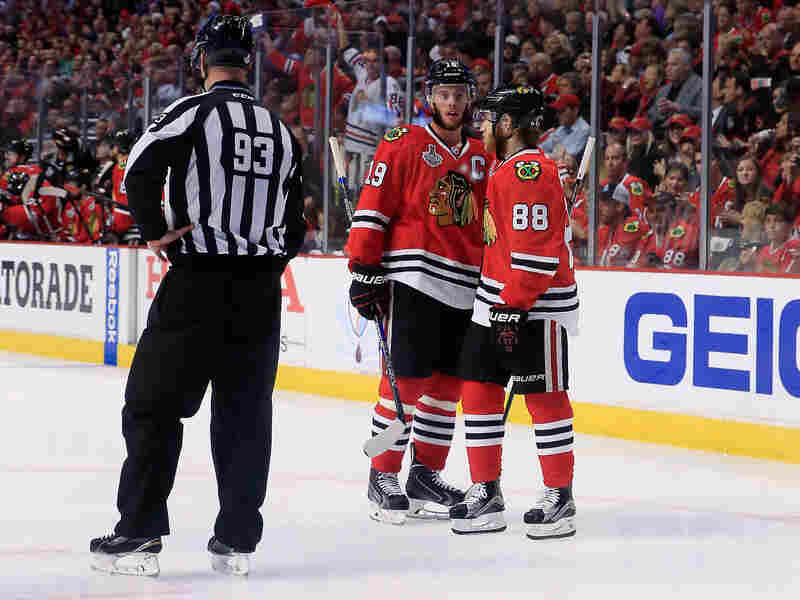Big Guns Having 'Equal Amounts Of Trouble' In Stanley Cup Finals
NPR’s Robert Siegel talks to Helene Elliott of the Los Angeles Times about the Stanley Cup. The series is tied 2-2, as the Chicago Blackhawks and Tampa Bay Lightning prepare for game five on Saturday.
Transcript
ROBERT SIEGEL, HOST:
LeBron James and Steph Curry, step aside. There is another series that is tied up 2-2 – the Stanley Cup final. Remember hockey, played on ice with a puck? Well, the Chicago Blackhawks and the Tampa Bay Lightning sure do. They’ll be playing game five tomorrow in Florida. And Helene Elliott, sports columnist for the Los Angeles Times, joins us from Tampa. Welcome to the program.
HELENE ELLIOTT: Thank you very much.
SIEGEL: Tied up 2-2, but you’ve written that it’s even closer than that. Explain that.
ELLIOTT: It’s just been remarkable. They’ve – every game has been decided by one goal. The teams have scored the identical number of goals. They’ve blocked the identical number of shots, and they’ve had identical problems in getting goals from their top goal scorers. Steven Stamkos of Tampa Bay has not scored a goal in the final. Patrick Kane of the Chicago Blackhawks hasn’t scored a goal in the final. So the big guns are having equal amounts of trouble on each side, and some of the lesser players have stepped up and played big roles for each team.
SIEGEL: And how do you describe the styles of these two teams?
ELLIOTT: It’s interesting because throughout the regular season, the Tampa Bay Lightning developed a reputation that’s kind of a high-scoring, fast-paced, run-and-gun kind of team. I guess maybe you can make an analogy to the Golden State Warriors. It’s just kind of, you know, up and back and lots of action, lots of speed, lot of skill. But in the playoffs, Tampa Bay has shown a lot of defensive skill. They just won the last game in Chicago 2-1 in a very hostile Chicago stadium, and it’s been interesting to see how they’ve evolved and recognized what it takes to win in the playoffs and made the kind of sacrifices that winning in the Stanley Cup playoffs requires of hockey players.
SIEGEL: What’s the word on Tampa Bay Lightning goaltender, Ben Bishop? Will he play tomorrow?
ELLIOTT: (Laughter). The word is undisclosed injury, and the other phrase is, we don’t know. The coach was very good today – Jon Cooper is his name – saying that he honestly does not know. And I tend to believe him in the sense that, you know, hockey players are known for their grit and playing through incredible amounts of pain. And for a player to kind of rule himself out of a game as Bishop did the other day in game four must mean he’s in a lot of pain. The kid who came in, a 20-year-old Russian kid named Andrei Vasilevskiy, was very poised, very calm, played extremely well, only his teammates didn’t score enough goals to support them in order for him to win. So at this point, nobody knows, and that’s part of the intrigue of this Stanley Cup final.
SIEGEL: Helene, as Stanley Cup finals go, how does this one rank?
ELLIOTT: It ranks pretty high. And I’m – was curious to see that the television ratings have been good as well. I think a lot of people thought, well, you know, Tampa Bay isn’t considered a traditional hockey market. The ratings will be low. But there’s been a good amount of interest. The Chicago Blackhawks, of course, are one of the so-called original six NHL teams. They have a very large fan base. They’re pursuing their third Stanley Cup in six seasons, so they have a lot of fans all over the country and all over North America, really. So having a large amount of viewership from the Chicago market was kind of a given. But the ratings have been good in a lot of different places, and it’s been a lot of fun to cover.
SIEGEL: Well, Helene Elliott of the LA Times, thanks for talking with us.
ELLIOTT: Thank you.
SIEGEL: Sports columnist Helene Elliott who’s in Tampa for game five of the Stanley Cup final tomorrow.
Copyright © 2015 NPR. All rights reserved. Visit our website terms of use and permissions pages at www.npr.org for further information.
NPR transcripts are created on a rush deadline by a contractor for NPR, and accuracy and availability may vary. This text may not be in its final form and may be updated or revised in the future. Please be aware that the authoritative record of NPR’s programming is the audio.
This entry passed through the Full-Text RSS service – if this is your content and you’re reading it on someone else’s site, please read the FAQ at fivefilters.org/content-only/faq.php#publishers.










